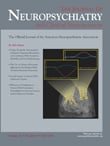To the Editor: Pellagra, a largely forgotten condition in Western economies, is a complex systemic disease caused by inadequate dietary intake of coenzyme precursors nicotinamide and tryptophan, whose main natural sources are meat. Pellagra was first described in the medical literature in 1735 by Spanish physician Gaspar Casal, who highlighted its relationship with poverty and dietary restrictions in rural populations.
1 Classical nosological descriptions have dictated that the clinical picture of pellagra is characterized by the three “Ds” of dermatitis, diarrhea, and dementia, which, if untreated, invariably lead to the fourth D (i.e., death).
The clinical hallmark of pellagra has long been identified with the characteristic dermatitis on sun-exposed skin (butterfly rash or “Casal’s necklace”) which earned the condition the lay name of “the sour skin” disease. Apart from dementia with subcortical features (cognitive slowness in addition to memory problems), neuropsychiatric symptoms have traditionally received little attention in modern pellagra literature. We hereby provide evidence that these symptoms were in fact central to early descriptions of pellagra.
Italian physician Gaetano Strambio (1752–1831) was appointed by Emperor Joseph II of the Hapsburgs as head of the pellagra hospital in Legnano (Milan) in 1874, and he devoted his professional life to the study and treatment of pellagra, an endemic disease in peasant populations based in Northern Italy across the 18th and 19th centuries. Strambio wrote some of the earliest treatises on pellagra based on his experience with large cohorts of patients. In his
Observations in the Royal Hospital for Pellagra 1784–1785,
2 he combined outstanding clinical acumen with remarkable scientific attitudes to provide accurate descriptions of 77 case histories (
historiae ).
These
Observations have never been translated from Latin and provide interesting demographic and clinical data on 77 pellagrins (36 males) with a focus on otherwise neglected neurological and psychiatric manifestations. In Strambio’s cohort, 13 patients exhibited muscular spasms, contractures and/or convulsions, four developed tremor, and two became bulimic. Of note, Strambio reported peculiar gait abnormalities (
festinatio ) in six patients and commented on the original description of
scelotyrbe festinans (“running disturbance of the limbs”) in pellagrins made by Sauvages in 1763
3 :
Quod bis vidit Sauvagesius, saepe in pellagrosis observavi; aegri scilicet aliquando corpore anterius inclinato currere coguntur, donec vel aliquid offendant, cui adhaereant, vel humi concidant, nisi ab adstantibus sustineantur.
[What Sauvages saw in two cases, I often observed in pellagrins; namely, patients at times are forced to run with the body bent forward, until they either lean onto obstacles or fall to the ground, unless grabbed by other people.]
2
Both Sauvages’ and Strambio’s observations document that
festinatio was consistently described in pellagrins decades before James Parkinson’s essay, while other parkinsonian features in pellagra were later reported by Paravicini.
4It has recently been suggested that cases of pellagra associated with alcohol abuse and HIV infection may be on the surge in both developing countries and in underprivileged segments of Western society.
5 Physicians should be aware of the wide spectrum of neuropsychiatric presentations for the early diagnosis and appropriate management of this treatable condition.

